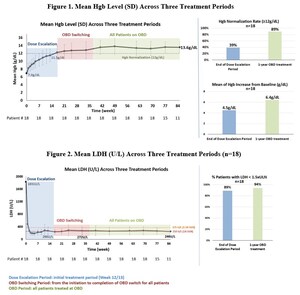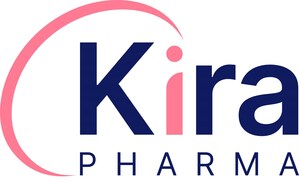CAMBRIDGE, Mass., June 17, 2024 /PRNewswire/ -- Kira Pharmaceuticals, a global biotechnology company pioneering transformational complement therapies to treat immune-mediated diseases, today announced positive long-term results from its Phase 2 study of KP104 in complement inhibitor-naïve patients with PNH. KP104 is a first-in-class dual-targeting complement inhibitor (C5 & Factor H) of both alternative and terminal pathways. The findings were presented at the 2024 European Hematology Association (EHA) Hybrid Congress in Madrid, Spain, highlighting KP104's transformative potential as a novel monotherapy for PNH to address the existing unmet medical needs.
Key highlights from the study include results from 18 patients treated with KP104 subcutaneously for up to 65 weeks, with 24- 26 weeks of the treatment time being on Optimal Biological Dose (OBD) for all patients, switched from 3 cohorts (n=6 per cohort) in dose escalation phase.
- Patients continued to show sustained improvements in hemoglobin levels after switching to OBD (Figure 1): 100% (18/18) achieved a ≥2 g/dL increase from baseline, and 89% (16/18) attained hemoglobin normalization (≥12 g/dL) with an average (SD) of 13.5 (1.4) g/dL in the absence of RBC transfusions. The remaining two patients with co-existing conditions, one with aplastic anemia (AA) and the other with myeloproliferative neoplasms (MPN), also demonstrated hemoglobin improvement approaching near-normal levels.
- Patients showed sustained control of LDH levels (Figure 2) to near-normal level throughout the entire treatment period, demonstrating strong IVH control. At the end of 24/26 weeks post-OBD switch, 94% (17/18) patients achieved LDH <1.5x ULN.
- All patients remained free from RBC transfusions between day 1 and week 65 of KP104 treatment.
- Significant clinical improvements were also observed in all other secondary endpoints: normalization of absolute reticulocyte counts, bilirubin levels, and FACIT-fatigue scores after switching to OBD.
- KP104 was safe and well-tolerated, and produced no treatment-emergent adverse events (TEAEs) at or above grade 3.
The affirming long-term results from the Phase 2 study further demonstrate KP104's potential as an optimal first-line monotherapy to safely and effectively control both intravascular and extravascular hemolysis of PNH. Global Phase 3 studies are being planned to potentially establish KP104 as the new standard of care for PNH.
"We are very encouraged by the robust efficacy and favorable safety profile demonstrated by KP104 in our Phase 2 study," said Dr. Wenru Song, Head of R&D at Kira Pharmaceuticals, "these long-term results support the advancement KP104 into Phase 3 trials. We are committed and look forward to bringing this promising therapy to patients suffering from PNH as quickly as possible."
Oral Presentation Details:
- Title: KP104, a bifunctional C5 mAb-Factor H fusion protein, effectively controls intravascular and extravascular hemolysis in complement inhibitor-naïve PNH patients: long-term results from a phase 2 study
- Authors: Bing Han, Fengkui Zhang, Li Zhang, Chen Yang, Changhe Yue, Chunrong Wang, Jay Ma, Chaomei He, Ping Tsui, Jingtao Wu, Qing Yu Christina Weng, Richard Lee, Helen Fu, Hui Yan, Wenru Song
- Session: s454 Clinical and Translational in Bone Marrow Failure and PNH
- Time: June 15, 2024, 16:30 - 17:45 CEST
The presentation slides will be available on Kira's website at https://www.kirapharma.com/publications.
About KP104
KP104 is a first-in-class bifunctional biologic designed to simultaneously block both the alternative (Factor H) and terminal (C5) complement pathways, providing a powerful and synergistic method of targeting the validated drivers of complement-mediated disease. This dual-target mechanism of action uniquely positions KP104 to address complement-mediated diseases and potentially provide greater benefits than single-target complement agents. Engineered to have an extended half-life and enhanced potency, KP104 has a formulation suitable for both intravenous and subcutaneous administrations. KP104 is entering Phase 2 POC trials across multiple renal disease and hematologic indications and has been granted Orphan Drug Designation by the FDA for the treatment of paroxysmal nocturnal hemoglobinuria. Phase 2 trials will be conducted globally, including in the U.S., China, and Australia. KP104 is an investigational agent not yet approved for any indication by any health authority.
About Paroxysmal Nocturnal Hemoglobinuria
Paroxysmal Nocturnal Hemoglobinuria is a rare, life-threatening blood disease that is characterized by the destruction of red blood cells, formation of blood clots, and impairment of bone marrow function. PNH affects between 1 and 5 people per million and is almost always caused by a genetic mutation that results in production of aberrant hematopoietic stem cells. These stem cells produce irregular red blood cells that are highly susceptible to destruction via complement activation. Current therapies include C5 inhibitors, which do not address extravascular hemolysis (EVH) related to the alternative pathway or a C3 inhibitor, which may address EVH but may not adequately block C5 downstream, leading to life-threatening breakthrough hemolysis (Breakthrough Hemolysis in PNH with Proximal or Terminal Complement Inhibition, N Engl J Med, July 14, 2022).
About Kira Pharmaceuticals
Kira Pharmaceuticals is a clinical-stage biotechnology company pioneering complement- targeted therapies to treat immune-mediated diseases. Enabled by its LOGIC platform, the company has developed a robust pipeline of novel assets against validated complement targets. Headquartered in Cambridge, Massachusetts and with facilities in China and Australia, Kira Pharmaceuticals has established a global team committed to advancing life-changing therapies to patients around the world. More information on Kira can be found at www.kirapharma.com and on LinkedIn.
CONTACT: [email protected]
SOURCE Kira Pharmaceuticals
WANT YOUR COMPANY'S NEWS FEATURED ON PRNEWSWIRE.COM?
Newsrooms &
Influencers
Digital Media
Outlets
Journalists
Opted In






Share this article